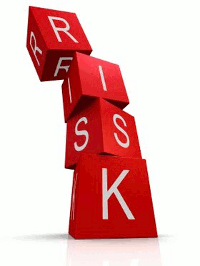 Life is full of risks, and risks are all around you as a trader. In a perfect world there would be no risks and any decision you make will turn out to be the best one. You can hope for win after win, and not even have to worry about the prospect of losing. Yet this is an unrealistic and impossible scenario because as we all know trading is all about risk. However, there is no need to be afraid of risk. We need to accept the fact that it is there, and rather than focusing on fear we need to know how to deal with it and manage it.
Life is full of risks, and risks are all around you as a trader. In a perfect world there would be no risks and any decision you make will turn out to be the best one. You can hope for win after win, and not even have to worry about the prospect of losing. Yet this is an unrealistic and impossible scenario because as we all know trading is all about risk. However, there is no need to be afraid of risk. We need to accept the fact that it is there, and rather than focusing on fear we need to know how to deal with it and manage it.
This is where risk management comes into play. As a trader you need to be disciplined. You need to know how to understand the way you are thinking. At the end of the day it is all about trading psychology. Trading is not solely about getting an understanding of the market, and the trading skills such as recognizing trading patterns and managing risks. It is also about training yourself to be self-assured without being too risky. It is about being cautious, but not wait too long to take an action. It is about blocking emotions and sentiments which could impair your judgments. The market is constantly changing and you are going to be constantly faced with challenges, and so risk is inevitable. However the risk taht you tae can be calculated.
Thus as a trader you will need to balance out your trading skills with your trading psychology so as to master the mental game of trading. Here are some general rules which can help you in risk management:
- Emotions have no place in trading. You need to make well planned and well calculated decisions that are not affected by sentiments. Otherwise your decision making process is going to take longer, and in all probability, be skewed.
- You need to accept that you are not perfect, and so there are going to be times when you succeed, and other times when you fail and lose money. Successes and failures will result in different, and extreme emotions, but these emotions need to be controlled so as to keep thinking straight.
- In order to minimize risks, many traders are well aware that it is best to opt for diversification. Having an diversified portfolio will help to reduce your risks. Money should be distributed across different kinds of investments so that in case a certain trading decision goes wrong it will be less likely to affect the trader in a dramatic way as one would still have other investments at one’s disposal.
- Gaining experience is what many traders believe in in order to succeed. Through experience you gain more insight and knowledge, as well as trading skills. However despite their importance, they are not going to be enough to back your progression as a trader. You need to couple this up with clear thinking.
- You need to have the willingness to take risks. However the risks that you take can be calculated and appropriate. Trading is risky, but in time you will learn how to go about it so as to minimize risks and the results thereafter. For instance, you should only risk money that you can afford to lose. Otherwise, it is best not to trade at all in such cases.

 Trading has to do a lot with yourself. Trading is not about the market.
Trading has to do a lot with yourself. Trading is not about the market.

 1) What goes up must come down and vice versa.
1) What goes up must come down and vice versa.  Desire and fear alternate in the minds of traders as they go through the day. But let me ask you whether desire or fear dominates your thoughts and feelings as you trade?
Desire and fear alternate in the minds of traders as they go through the day. But let me ask you whether desire or fear dominates your thoughts and feelings as you trade?